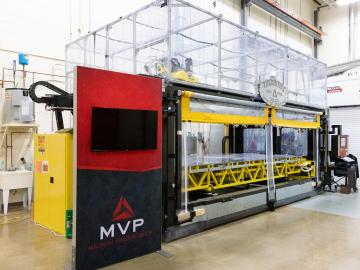
Filter News
Area of Research
- Advanced Manufacturing (22)
- Biological Systems (1)
- Biology and Environment (46)
- Building Technologies (1)
- Computational Biology (2)
- Computational Engineering (2)
- Computer Science (11)
- Electricity and Smart Grid (3)
- Energy Science (137)
- Functional Materials for Energy (1)
- Fusion and Fission (13)
- Fusion Energy (2)
- Isotope Development and Production (1)
- Isotopes (10)
- Materials (63)
- Materials for Computing (13)
- National Security (25)
- Neutron Science (35)
- Nuclear Science and Technology (11)
- Quantum information Science (9)
- Sensors and Controls (1)
- Supercomputing (102)
News Topics
- (-) 3-D Printing/Advanced Manufacturing (146)
- (-) Big Data (79)
- (-) Biomedical (73)
- (-) Grid (74)
- (-) ITER (9)
- (-) Machine Learning (68)
- (-) Polymers (35)
- (-) Quantum Science (93)
- (-) Space Exploration (26)
- (-) Summit (71)
- Advanced Reactors (40)
- Artificial Intelligence (131)
- Bioenergy (112)
- Biology (128)
- Biotechnology (39)
- Buildings (74)
- Chemical Sciences (86)
- Clean Water (33)
- Composites (35)
- Computer Science (226)
- Coronavirus (48)
- Critical Materials (29)
- Cybersecurity (35)
- Education (5)
- Element Discovery (1)
- Emergency (4)
- Energy Storage (114)
- Environment (218)
- Exascale Computing (67)
- Fossil Energy (8)
- Frontier (64)
- Fusion (66)
- High-Performance Computing (130)
- Hydropower (12)
- Irradiation (3)
- Isotopes (62)
- Materials (157)
- Materials Science (158)
- Mathematics (12)
- Mercury (12)
- Microelectronics (4)
- Microscopy (56)
- Molten Salt (10)
- Nanotechnology (64)
- National Security (86)
- Neutron Science (171)
- Nuclear Energy (122)
- Partnerships (68)
- Physics (69)
- Quantum Computing (53)
- Security (31)
- Simulation (65)
- Software (1)
- Statistics (4)
- Transportation (103)
Media Contacts

Oak Ridge National Laboratory researchers have developed a machine learning model that could help predict the impact pandemics such as COVID-19 have on fuel demand in the United States.

Real-time measurements captured by researchers at ORNL provide missing insight into chemical separations to recover cobalt, a critical raw material used to make batteries and magnets for modern technologies.

ORNL has licensed two additive manufacturing-related technologies that aim to streamline and ramp up production processes to Knoxville-based Magnum Venus Products, Inc., a global manufacturer of fluid movement and product solutions for industrial

After its long journey to Mars beginning this summer, NASA’s Perseverance rover will be powered across the planet’s surface in part by plutonium produced at the Department of Energy’s Oak Ridge National Laboratory.

ORNL researchers have developed an intelligent power electronic inverter platform that can connect locally sited energy resources such as solar panels, energy storage and electric vehicles and smoothly interact with the utility power grid.

A team led by Dan Jacobson of Oak Ridge National Laboratory used the Summit supercomputer at ORNL to analyze genes from cells in the lung fluid of nine COVID-19 patients compared with 40 control patients.

From materials science and earth system modeling to quantum information science and cybersecurity, experts in many fields run simulations and conduct experiments to collect the abundance of data necessary for scientific progress.

Five researchers at the Department of Energy’s Oak Ridge National Laboratory have been named ORNL Corporate Fellows in recognition of significant career accomplishments and continued leadership in their scientific fields.

Scientists at ORNL used neutron scattering and supercomputing to better understand how an organic solvent and water work together to break down plant biomass, creating a pathway to significantly improve the production of renewable

Researchers at Oak Ridge National Laboratory developed a method that uses machine learning to predict seasonal fire risk in Africa, where half of the world’s wildfire-related carbon emissions originate.


